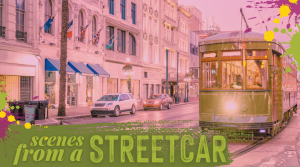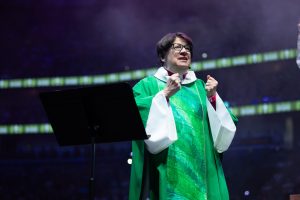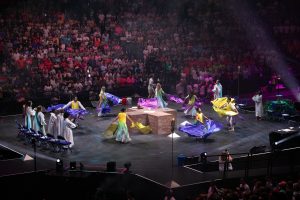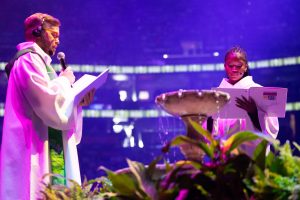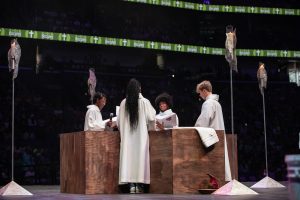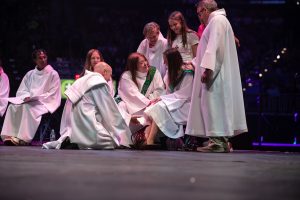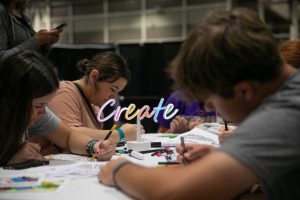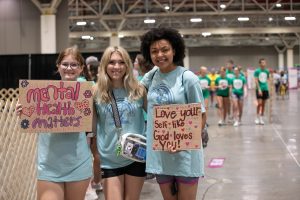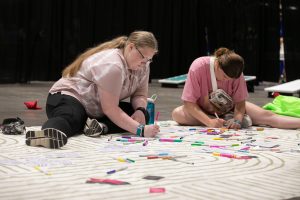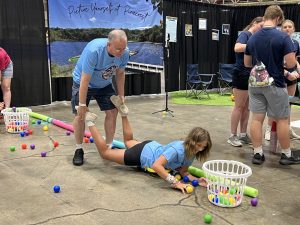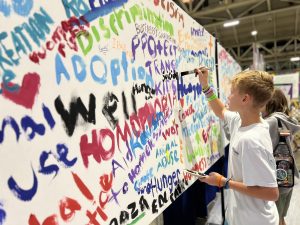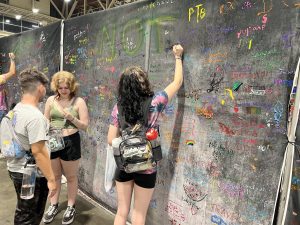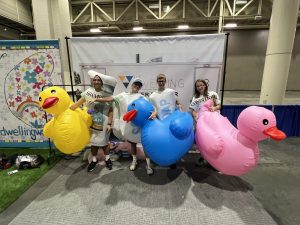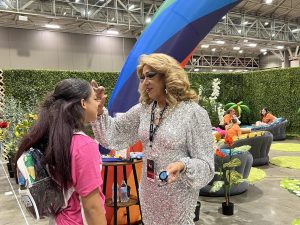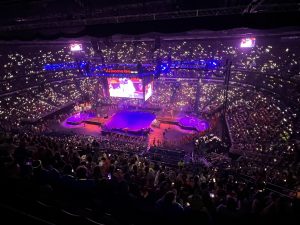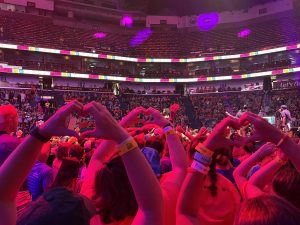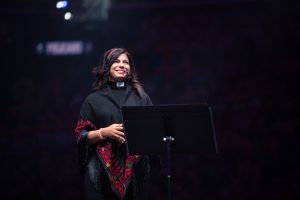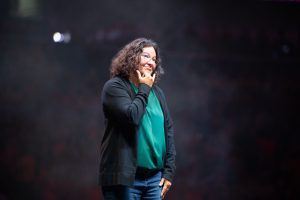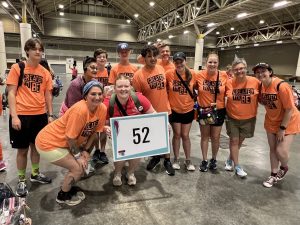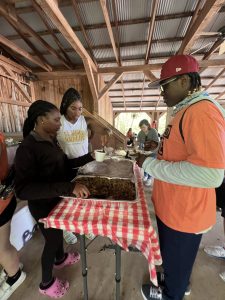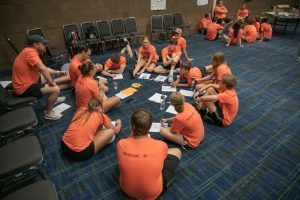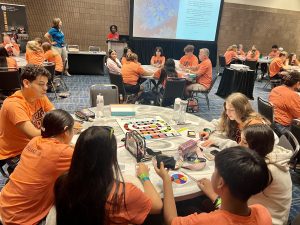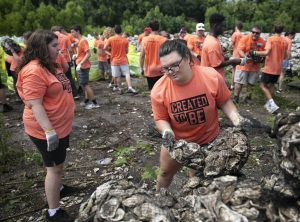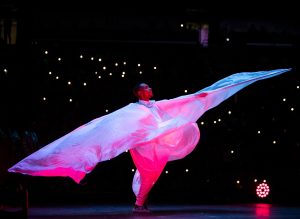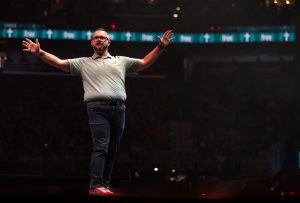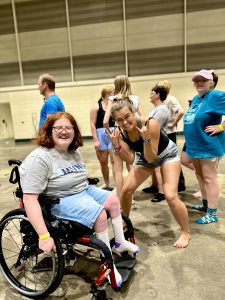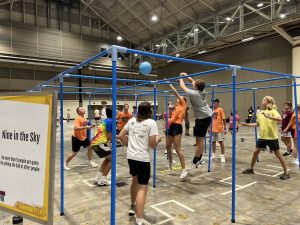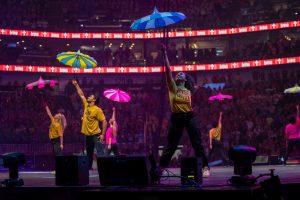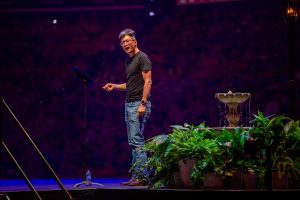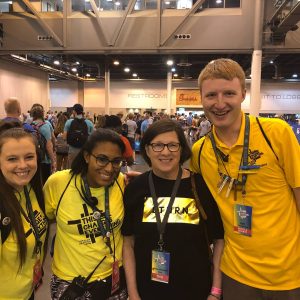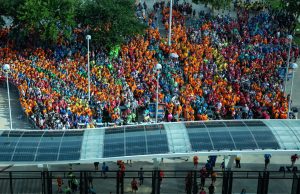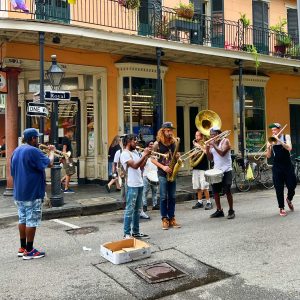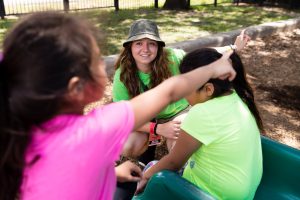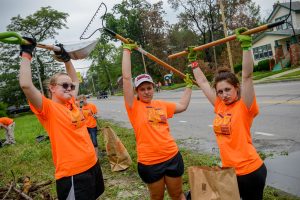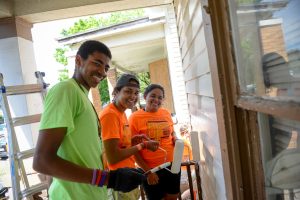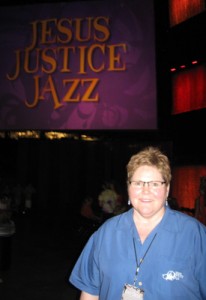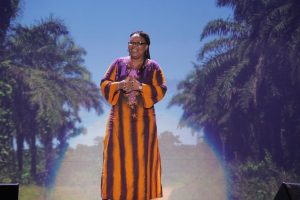The following is taken from the 2024 ELCA World Hunger Lent Study. The full resource can be ordered as a hardcopy or downloaded as a PDF in English or Spanish at the link here.
Week 3 — Crucifixion Exodus
•••
Exodus 20:1-17
Psalm 19
1 Corinthians 1:18-25
John 2:13-22
“We proclaim Christ crucified, a stumbling block to Jews and foolishness to Gentiles.”
—1 Corinthians 1:23
In this week of Lent, having reflected on encountering God in reconciliation and in transfiguration, we turn toward Paul’s message of “Christ crucified” and reflect on what it means to encounter God in crucifixion, to be confronted with our own participation in systemic oppression.
Founded in 1888, Bethlehem Lutheran Church in the Central City neighborhood of New Orleans, La., is the oldest historically Black ELCA congregation in the continental United States. The church has a long legacy of responding to the needs of its members and neighbors. One way Bethlehem carries on that legacy is through the Community Table, a feeding ministry that provides free, no-questions-asked gourmet meals every week. This ministry, which is supported by ELCA World Hunger, helps to meet the need for food in Central City. The median household income in Bethlehem’s ZIP code is slightly more than $26,189, less than one-third of the median household income in the United States ($69,021 at the time of writing). More than 15% of the people in Orleans Parish are food-insecure.
With so many workers relying on the city’s tourism and hospitality industry, Bethlehem Lutheran saw a rapid increase in the number of people needing food during the COVID-19 pandemic. Working with partners, the Community Table was able to expand, and by this spring it was providing a free lunch four times a week, serving over 600 meals weekly. As the need has increased, Bethlehem Lutheran has been able to meet it.
A key leader in helping the Community Table and Bethlehem respond during and after the pandemic was Chef De, who planned, coordinated, supervised, cooked and served hundreds of meals for people who came to the Table. “I don’t think Bethlehem would have made it through the pandemic if it were not for Chef De,” says the Rev. Ben Groth, pastor of Bethlehem Lutheran. “And I also believe it to be true that many of our neighbors would not have made it without her, too.”
As noted by Mike Scott, a writer for the New Orleans Times-Picayune, the Central City neighborhood has a long, rich history: it is home to New Zion Baptist Church, where the Southern Christian Leadership Conference was formally incorporated. Yet, as Scott also writes, by the early 2000s, Central City had become “defined [by some people] by its crime rate” and its “crushing poverty.”[1]
Some people might easily let the community’s present challenges define its future. We see this often when cities are dealing with statistically high rates of poverty, food insecurity or crime. Outsiders looking in dismiss such neighborhoods as nothing more than their statistics or decide they must be “saved” by the decisive action of political leaders.
Journeying together through Lent, we are invited to consider what it means for us today that God’s son was crucified 2,000 years ago. Lent has often been a season for us to take stock of our own sinfulness and need for repentance. In many ways the cross is a mirror, reflecting back to us our entanglement in sin. Yet the cross is also a lens, a way of perceiving and apprehending the world. All too frequently during Lent, we lose sight of the latter aspect.
As a lens, the cross shapes how we understand ourselves, our world and our communities. It reminds us that God is present in Jesus’ suffering and death on the cross. This doesn’t mean that suffering or death are God’s work or that there is something redemptive in suffering or death. Quite the contrary: a cross-shaped (cruciform) lens compels us to recognize suffering for what it is, to name it and confront it.
This is the foolishness Paul describes in his letter to the Corinthians. Who would ever recognize God in the broken, pierced and dying body of Christ? Russian novelist Fyodor Dostoyevsky, upon seeing a painting of a dead Christ, is reported to have remarked to his wife that such a painting could cause one to lose their faith. This is what Paul means, in part, by the “foolishness” of the message of the cross (1 Corinthians 1:18). To preach the message of Christ crucified is foolishness to those who cannot fathom the presence of divinity within frailty or weakness, who cannot comprehend God as both actor and victim.
Yet that is precisely what the cross demands of us. To preach Christ crucified, to journey through Lent to the cross, is to bind ourselves to honesty, to the sort of truth-telling that names suffering and injustice for what they are yet still affirms the presence of God. For Central City and Bethlehem Lutheran Church, the message of Christ crucified affirms that stories of poverty or hunger aren’t the only stories being written or told in the community. It may be foolishness to those on the outside looking in, but it is gospel truth for those who encounter God at a community table where neighbors prepare, provide and share meals.
To encounter God within the crucifixion is to be reminded that we cannot ignore the truth of suffering, hunger, poverty, violence, death and injustice in a world still waiting for the fullness of the reign of God. But to encounter God in this event is to be radically open to God’s presence in this same as-yet-incomplete world. It is to seek God within our communities and one another, even as the world declares this seeking to be “foolishness.” It is to affirm with faithful certainty that in the stories of our neighbors and neighborhoods, God is being revealed to us in sometimes new and surprising ways.
Reflection Questions
What do you think Paul means by “foolishness”?
How does your perception of Central City or your own community change when you look at them through a cross-shaped lens?
In what new or unexpected ways have you encountered God, especially as you faced your own “crosses”?
What might it mean to “bind ourselves to honesty, to the sort of truth-telling that names suffering and injustice for what they are yet still affirms the presence of God”?
Semana 3 — Crucifixión
•••
Éxodo 20:1-17
Salmo 19
1 Corintios 1:18-25
Juan 2:13-22
“Mientras que nosotros predicamos a Cristo crucificado. Este mensaje es motivo de tropiezo para los judíos y es locura para los no judíos”. —1 Corintios 1:23
En esta semana de Cuaresma, después de haber reflexionado sobre el encuentro con Dios en la reconciliación y en la transfiguración, nos dirigimos hacia el mensaje de Pablo de “Cristo crucificado” y reflexionamos sobre lo que significa encontrar a Dios en la crucifixión, para ser confrontados con nuestra propia participación en la opresión sistémica.
Fundada en 1888, Bethlehem Lutheran Church [Iglesia Luterana Belén] en el vecindario de Central City de Nueva Orleans, Luisiana, es la congregación históricamente negra de la ELCA más antigua de los Estados Unidos continentales. La iglesia tiene un largo legado de responder a las necesidades de sus miembros y vecinos. Una de las formas en que Bethlehem continúa con ese legado es a través de Community Table [Mesa Comunitaria], un ministerio de alimentación que todas las semanas ofrece comidas gourmet gratuitas y sin hacer preguntas. Este ministerio, que cuenta con el respaldo de ELCA World Hunger, ayuda a satisfacer la necesidad de comida en Central City. El ingreso familiar promedio en el código postal de Bethlehem es un poco más de $ 26,189, menos de un tercio del ingreso familiar promedio en los Estados Unidos ($ 69,021 en el momento de escribir este artículo). Más del 15% de las personas en Orleans Parish sufren inseguridad alimentaria.
Con tantos trabajadores que dependen de la industria del turismo y la hospitalidad de la ciudad, Bethlehem Lutheran vio un rápido aumento en el número de personas que necesitaban comida durante la pandemia de COVID-19. Al trabajar con socios, Community Table pudo expandirse, y para esta primavera estaba dando un almuerzo gratis cuatro veces a la semana, sirviendo más de 600 comidas semanales. A medida que la necesidad ha aumentado, Bethlehem Lutheran ha sido capaz de satisfacerla.
Una líder clave que ayudó a Community Table y a Bethlehem a responder durante y después de la pandemia fue la chef De, quien planificó, coordinó, supervisó, cocinó y sirvió cientos de comidas para las personas que vinieron a la mesa. “No creo que Bethlehem hubiera sobrevivido a la pandemia si no fuera por la chef De”, dice el reverendo Ben Groth, pastor de Bethlehem Lutheran. “Y también creo que es cierto que muchos de nuestros vecinos no lo habrían logrado sin ella.
Como señaló Mike Scott, escritor de New Orleans Times-Picayune, el vecindario de Central City tiene una larga y rica historia: es el hogar de la Iglesia Bautista New Zion [Nueva Sión], donde se incorporó formalmente la Southern Christian Leadership Conference [Conferencia de Liderazgo Cristiano del Sur]. Sin embargo, como también escribe Scott, a principios de la década de 2000, Central City había llegado a ser “definida [por algunas personas] por su tasa de criminalidad” y su “pobreza aplastante”.[1]
Algunas personas podrían dejar que los desafíos actuales de la comunidad definan su futuro. A menudo vemos esto cuando las ciudades se enfrentan a tasas estadísticamente altas de pobreza, inseguridad alimentaria o delincuencia. Las personas externas que miran hacia adentro desestiman esos barrios como nada más que sus estadísticas o deciden que deben ser “salvados” por la acción decisiva de los líderes políticos.
En nuestra jornada juntos durante la Cuaresma se nos invita a considerar lo que significa para nosotros hoy que el hijo de Dios fue crucificado hace 2,000 años. La Cuaresma ha sido a menudo una temporada para que hagamos un balance de nuestra propia pecaminosidad y necesidad de arrepentimiento. En muchos sentidos, la cruz es un espejo que nos refleja nuestra participación en el pecado. Sin embargo, la cruz es también una lente, una forma de percibir y aprehender el mundo. Con demasiada frecuencia, durante la Cuaresma perdemos de vista este último aspecto.
Como lente, la cruz moldea la forma en que nos entendemos a nosotros mismos, a nuestro mundo y a nuestras comunidades. Nos recuerda que Dios está presente en el sufrimiento y la muerte de Jesús en la cruz. Esto no significa que el sufrimiento o la muerte sean obra de Dios o que haya un elemento redentor en el sufrimiento o la muerte. Todo lo contrario; una lente en forma de cruz (cruciforme) nos obliga a reconocer el sufrimiento por lo que es, a nombrarlo y enfrentarlo.
Esta es la locura que Pablo describe en su carta a los Corintios. ¿Quién reconocería a Dios en el cuerpo quebrantado, traspasado y moribundo de Cristo? Se dice que el novelista ruso Fiódor Dostoievski, al ver una pintura de Cristo muerto, le comentó a su esposa que tal pintura podría hacer que uno perdiera la fe. Esto es lo que Pablo quiere decir, en parte, con la “locura” del mensaje de la cruz (1 Corintios 1:18). Predicar el mensaje de Cristo crucificado es una locura para aquellos que no pueden comprender la presencia de la divinidad dentro de la fragilidad o la debilidad; que no pueden comprender a Dios como actor y víctima.
Sin embargo, eso es precisamente lo que la cruz exige de nosotros. Predicar a Cristo crucificado, caminar a través de la Cuaresma hasta la cruz, es comprometerse con la honestidad, con el tipo de verdad que llama el sufrimiento y la injusticia por lo que son, pero que aun así afirma la presencia de Dios. Para Central City y Bethlehem Lutheran Church, el mensaje de Cristo crucificado afirma que las historias de pobreza o hambre no son las únicas historias que se escriben o cuentan en la comunidad. Para las personas externas que miran hacia adentro puede ser una tontería, pero es la verdad del evangelio para aquellos que se encuentran con Dios en una mesa comunitaria donde los vecinos preparan, proveen y comparten comidas.
Encontrar a Dios en la crucifixión es recordar que no podemos ignorar la verdad del sufrimiento, el hambre, la pobreza, la violencia, la muerte y la injusticia en un mundo que todavía espera la plenitud del reino de Dios. Pero encontrar a Dios en este evento es estar radicalmente abierto a la presencia de Dios en este mismo mundo aún incompleto. Es buscar a Dios dentro de nuestras comunidades y entre nosotros, incluso cuando el mundo declara que esta búsqueda es una “locura”. Es afirmar con fiel certeza que, en las historias de nuestros vecinos y vecindarios, Dios se nos está revelando de maneras a veces nuevas y sorprendentes.
[1] Mike Scott, “A Brief History of Central City, the Forsaken Heart of New Orleans,” Nola.com, July 12, 2019, tinyurl.com/mpks2x8m.
[1] Mike Scott, “A Brief History of Central City, the Forsaken Heart of New Orleans” [Breve historia de Central City, el corazón abandonado de Nueva Orleans] Nola. com, 12 de julio de 2019, tinyurl.com/mpks2x8m

